Biya regime raises passport, ID card, and visa fees, private firms benefit most
An ordinance signed by President Paul Biya on June 20, 2024, amending Cameroon’s 2024 budget law, details how tax revenues from issuing identity documents, passports, and consular services are distributed. The private consortium INCM-Augentic, primarily responsible for providing these documents, is set to benefit the most from the fee increases.
According to the ordinance, INCM-Augentic receives 82.40% of tax revenues for each ordinary passport issued, renewed, or extended, far surpassing the Treasury’s share (11.24%) and the National Security Delegation (DGSN) (6.36%). For instance, out of the CFA 110,000 fee paid per ordinary passport, INCM-Augentic pockets CFA 90,640, while DGSN receives only CFA 6,996 and the Treasury CFA 12,364.
The CFA 200 million (€131 billion) contract awarded to INCM-Augentic allows them to build and operate the passport infrastructure for 10 years before transferring it back to the state. According to the German Embassy in Cameroon, INCM-Augentic invested €30 million (CFA 19.6 billion) to construct the national passport production center. Finance Minister Louis Paul Motaze justified raising the stamp cost from CFA 75,000 to CFA 110,000 by citing INCM-Augentic’s investments. However, it’s unclear if this revenue split will continue throughout the contract, which began in 2020.
Regarding national identity cards (CNI), the same private consortium collects 90% of stamp duties, with DGSN receiving 10% and the Treasury none. The presidential ordinance raises the CNI stamp price from CFA 1,000 to CFA 10,000, a tenfold increase. Thus, out of the CFA 10,000 fee, the Germano-Portuguese consortium will pocket CFA 9,000, while DGSN receives CFA 1,000. It’s uncertain if this arrangement will persist for the consortium’s 15-year contract duration. The CNI stamp hike aims to finance Cameroon’s modernization project for identification, enabling 48-hour or quicker CNI issuance, according to Police Chief Martin Mbarga Nguele.
The DGSN signed a contract with INCM-Augentic on May 13 to finance, operate, develop, and launch a new secure identification system in Cameroon. The agreement includes constructing a national ID production center in Yaoundé and two annex centers in Douala and Garoua, each with 25 enrollment stations. Construction of these facilities commenced on June 19, as reported by SBBC. The deal also involves building 68 state-of-the-art multifunctional centers across Cameroon’s 10 regions and 58 departments, alongside renovating 219 existing identification stations for modernization.
For visas, including normal and express types, the presidential decree allocates 44% of tax revenues to the Treasury, 46% to the private provider, and 10% to government administrations. In 2022, Cameroon awarded a contract to Ivorian firm Impact Palmarès R&D SAS to secure its electronic visa system by constructing a data center in Yaoundé. This public-private partnership aims to standardize consular services in Cameroon over a ten-year renewable period, said Patrice Koe Jr., Director of Communication, Documentation, and Diplomatic Archives at the Ministry of External Relations. The contract’s financial details were not disclosed.
This detailed revenue distribution in the recent presidential ordinance raises concerns about fairness and access to essential services for Cameroonian citizens. While authorities justify these public-private partnerships by citing infrastructure modernization and service efficiency and security improvements, the high costs imposed on citizens for crucial documents like CNIs raise growing concerns. Some argue that these enhancements come with significantly increased fees, posing a particularly heavy financial burden on low-income Cameroonians.
Source: Business in Cameroon




